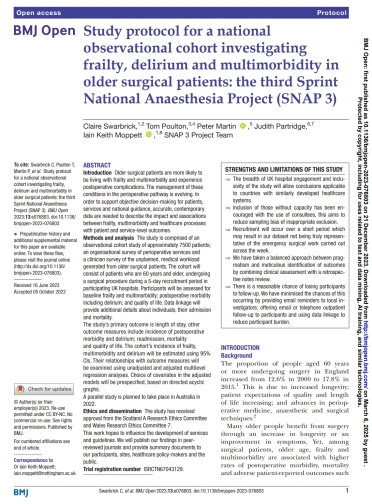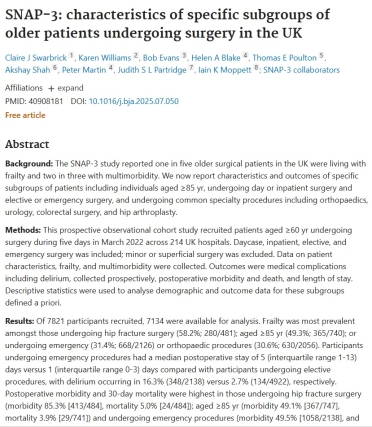SNAP3 (Frailty and Delirium)
SNAP3 (Frailty and Delirium)
The 3rd Sprint National Anaesthesia Project (SNAP-3) was an observational cohort study that aimed to describe the impact of frailty and delirium, and their management, on outcomes following surgery in older people.

SNAP3 was generously supported by the RCoA and Frances and Augustus Newman Foundation.
SNAP3 (Frailty and Delirium): Project Outline
SNAP3 was the third Sprint National Anaesthesia Project, managed by the RCoA Centre for Research and Improvement (CR&I) in conjunction with the University of Nottingham.
SNAP3 looked to describe the impact of frailty, multimorbidity and postoperative delirium in older people following surgery. It also aimed to improve decision making by patients and clinicians, as well as providing evidence for optimal design of perioperative services. The study recruited patients over a snapshot period of five days between the 21st - 25th March 2022, with inpatient and outpatient follow up.
SNAP3 was the third Sprint National Anaesthesia Project, managed by the University of Nottingham, the Royal College of Anaesthetists and the Health Services Research Centre (HSRC).
The number of older people undergoing surgery globally is increasing due to demographic changes and improvements in surgical and perioperative care. Frailty is an age-related syndrome that increases an individual's vulnerability to adverse outcomes in response to stressors such as illness, injury and surgery.
There is reasonable evidence that surgical outcomes are worse in the presence of frailty. Whilst the link between socioeconomic status, frailty and health outcomes is well-described in the community setting, less is known about these factors in the surgical setting. Furthermore, little is known about the importance of particular domains of frailty and the relationship with surgical outcome. Screening for frailty is increasingly advocated but there is a lack of consensus on which tool to use for screening and/or diagnosis in the perioperative setting. Many 'frailty' tools are instead counts of multimorbidity as opposed to multi-domain frailty assessment tools. Distinguishing between multimorbidity and frailty is important given the recognition that seven out of ten frail individuals also display multimorbidity, but only two of ten patients with multimorbidity are also frail.
Delirium is a distinct clinical syndrome associated with adverse outcomes following surgery. Less is known about the influence of severity, timing or form (hyperactive or hypoactive) of delirium on postoperative outcomes. To date, there is no effective pharmacological treatment to prevent delirium, with evidence instead supporting non-pharmacological multicomponent interventions aiming to reduce the incidence of delirium through targeting the triggers for the syndrome, in addition to reducing severity.
Whilst evidence supports commonality in the aetiology and pathogenesis of frailty and delirium, less is known about the interface of these distinct syndromes in the perioperative setting. The initial suggestion from the data is that these two conditions confer cumulative negative effect on postoperative outcomes, but this requires further exploration at scale.
A key question for researchers, clinicians, those responsible for planning perioperative services, and most importantly, patients and their families, is therefore, how to identify frailty and risk of delirium in routine clinical settings. If frailty and delirium can be identified then we can move on to answer questions like what should clinicians do with frailty, multimorbidity and delirium risk in the time before surgery and how should these conditions be managed during and after surgery. This study will generate a large, high-quality dataset on a cohort of older people undergoing a range of surgical procedures to help address these questions.
Study design
SNAP 3 involves three parallel studies:
- S1 Prospective observational patient cohort study
- S2 Organisational clinician survey of current perioperative care
- S3 Clinician survey of acute referrals and interventions to general and geriatric medicine
- To characterise the epidemiology of frailty, multimorbidity and postoperative delirium in approximately 12 000 older people undergoing surgery in the UK
- Examine the relationship between frailty and perioperative outcomes separately by surgery types
- Examine the relationship between multimorbidity and perioperative outcomes separately by surgery types
- Examine the relationship between frailty and multimorbidity in the older person undergoing surgery
- Describe the variation in hospital-level and patient-level frailty-related interventions
- Identify associations between hospital-level and patient-level frailty-related interventions and outcome
- Develop and internally validate a risk-prediction tool for postoperative delirium.
Thank you SNAP3 Collaborators! We have confirmed the names of all SNAP3 Collaborators with local Principal Investigators. SNAP3 was a success because of each and every one of you! Click here for a list of all collaborators.
Please click here for SNAP3 Study Documents, including the protocol, ethics documents, and help sheets.
SNAP3 Publications
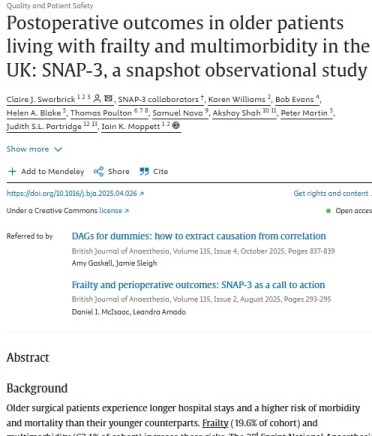
SNAP3 (Frailty and Delirium) - Main Paper
Postoperative outcomes in older patients living with frailty and multimorbidity in the UK
Meet the SNAP3 (Frailty & Delirium) team

Professor of Anaesthesia and Perioperative Medicine at the University of Nottingham and an honorary consultant Anaesthetist. He is the chair of the RCoA Centre for Research and Improvement.
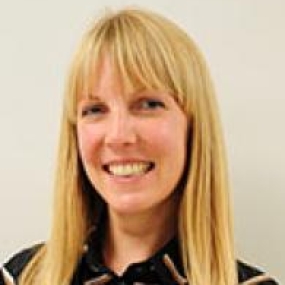
Consultant Geriatrician at Guy's and St Thomas' NHS Foundation Trust.
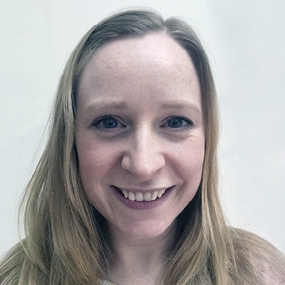
ST6 anaesthetic registrar based in Peninsula Deanery
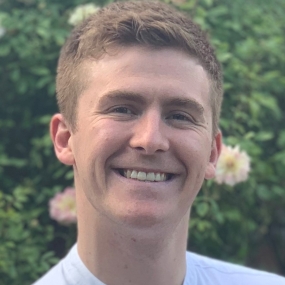
ST4 Anaesthetic registrar based in Bath
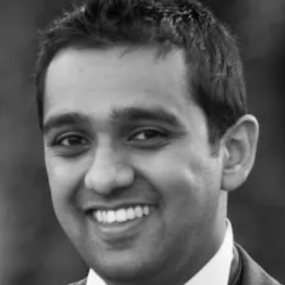
NIHR Academic Clinical Lecturer in Intensive Care Medicine & Honorary Specialty Registrar in Anaesthesia & Intensive Care

Tom is a UK-trained anaesthetist and intensivist, currently working in Melbourne, Australia.

